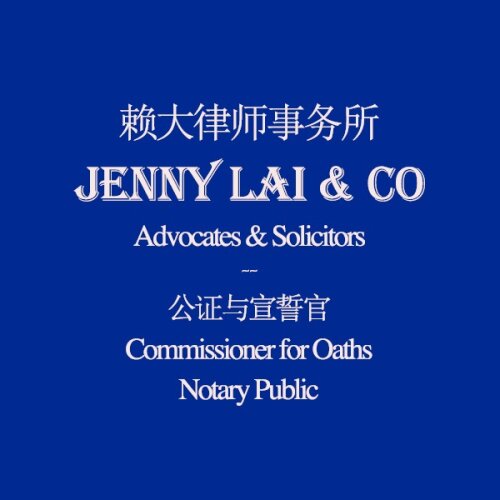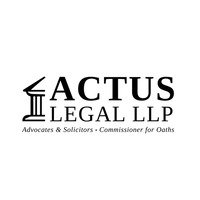Best Trusts Lawyers in Chinatown
Share your needs with us, get contacted by law firms.
Free. Takes 2 min.
List of the best lawyers in Chinatown, Singapore
Singapore Trusts Legal Questions answered by Lawyers
Browse our 1 legal question about Trusts in Singapore and read the lawyer answers, or ask your own questions for free.
- deed poll
- Hi, can I check what is your quote for the deed poll for a change of name?
-
Lawyer answer by Bhavini S Law Practice
Hello. Our charges for Deed Poll is SGD 70.00.
Read full answer
About Trusts Law in Chinatown, Singapore
A trust is a legal arrangement where a person or an institution (the trustee) controls assets or property for the benefit of another person or group of people (the beneficiaries). Trust law in Chinatown, Singapore, adheres to the principles outlined in the Trustees Act, and additional regulations in the Trust Companies Act.
Why You May Need a Lawyer
Trusts can be complex to set up and require a solid understanding of trust law, taxes, and property law. Individuals may need a lawyer to set up a trust, modify an existing trust, resolve a dispute over a trust, or advise on issues related to administration of trusts. Lawyers can also advise on the choice of trust that best suits your needs, such as a Living Trust, Testamentary Trust, Revocable Trust, or Charitable Trust.
Local Laws Overview
Key aspects of local trusts law in Singapore include mandatory duties for trustees, provisions for revocable and irrevocable trusts, and precise definitions of beneficiaries. The Trustees Act and the Trust Companies Act govern the formation, operation and dissolution of trusts, and trustees in Singapore. They also govern potential penalties for breaches of trust. There are specific tax implications for trusts, which differ depending on whether it is a local or foreign trust.
Frequently Asked Questions
What is a trust?
A trust is a legal institution where property or assets are held by one party for the benefit of another.
Why would I need a trust?
Trusts are set up for a variety of reasons including wealth management, asset protection, tax planning, succession planning, and charitable giving.
What are the roles in a trust?
The key roles involved in a trust are the settlor (who creates the trust), the trustee (who manages the trust), and the beneficiary (who benefits from the trust).
What are the duties of a trustee?
A trustee has a fiduciary duty to act in the best interest of the beneficiary and manage the trust property responsibly. This includes duties of loyalty, impartiality, prudence, and diversification of investments.
Can a trust be revoked?
This depends on the type of trust. A revocable trust can be altered or revoked by the settlor, while an irrevocable trust cannot be changed once it's established without the consent of the beneficiaries.
Additional Resources
The Monetary Authority of Singapore provides resources and information related to trust law in Singapore. The Law Society of Singapore and the Singapore Trustees Association also offer guidance and resources on trusts.
Next Steps
If you need legal assistance with trusts in Chinatown, Singapore, your next step should be to consult with a legal professional. Lawyers specialized in trusts can provide valuable advice based on your specific needs and circumstances.
Lawzana helps you find the best lawyers and law firms in Chinatown through a curated and pre-screened list of qualified legal professionals. Our platform offers rankings and detailed profiles of attorneys and law firms, allowing you to compare based on practice areas, including Trusts, experience, and client feedback.
Each profile includes a description of the firm's areas of practice, client reviews, team members and partners, year of establishment, spoken languages, office locations, contact information, social media presence, and any published articles or resources. Most firms on our platform speak English and are experienced in both local and international legal matters.
Get a quote from top-rated law firms in Chinatown, Singapore — quickly, securely, and without unnecessary hassle.
Disclaimer:
The information provided on this page is for general informational purposes only and does not constitute legal advice. While we strive to ensure the accuracy and relevance of the content, legal information may change over time, and interpretations of the law can vary. You should always consult with a qualified legal professional for advice specific to your situation.
We disclaim all liability for actions taken or not taken based on the content of this page. If you believe any information is incorrect or outdated, please contact us, and we will review and update it where appropriate.









